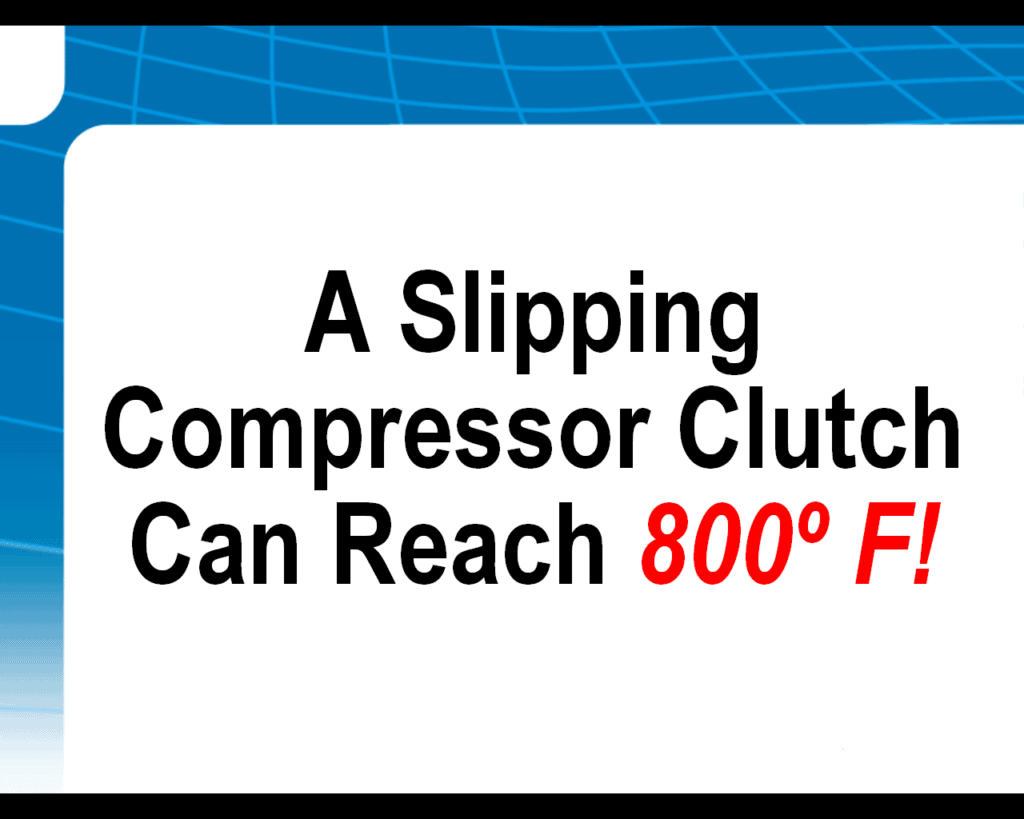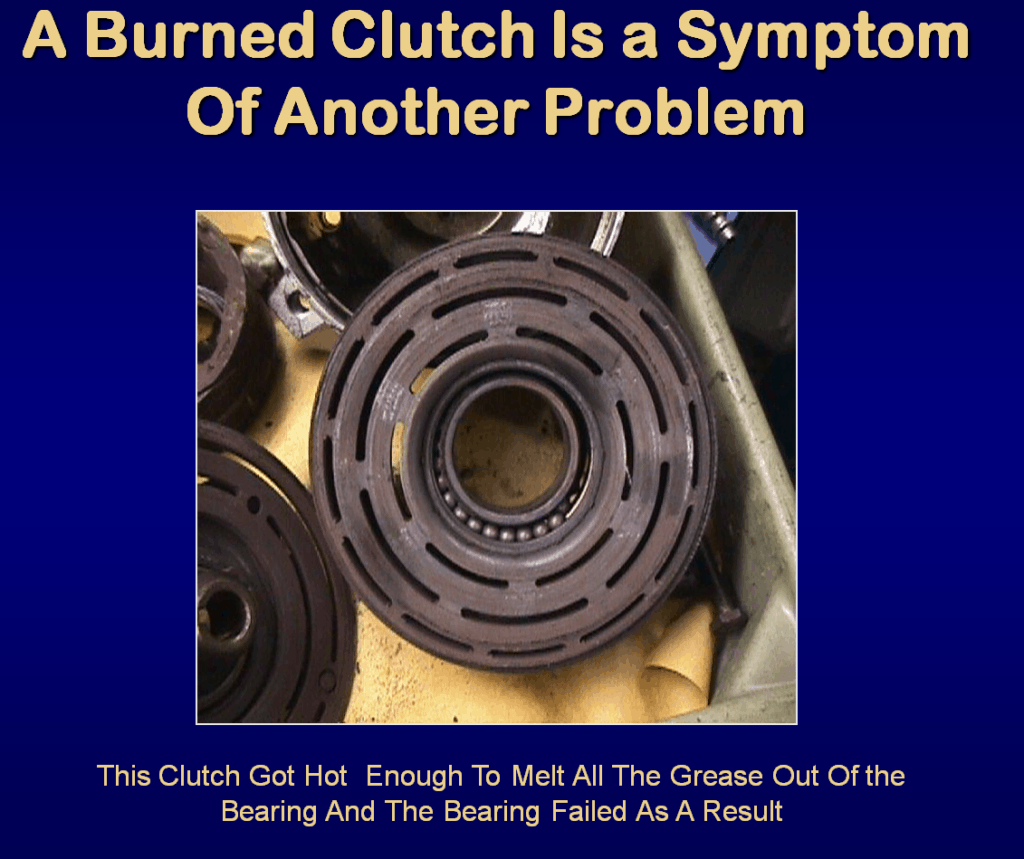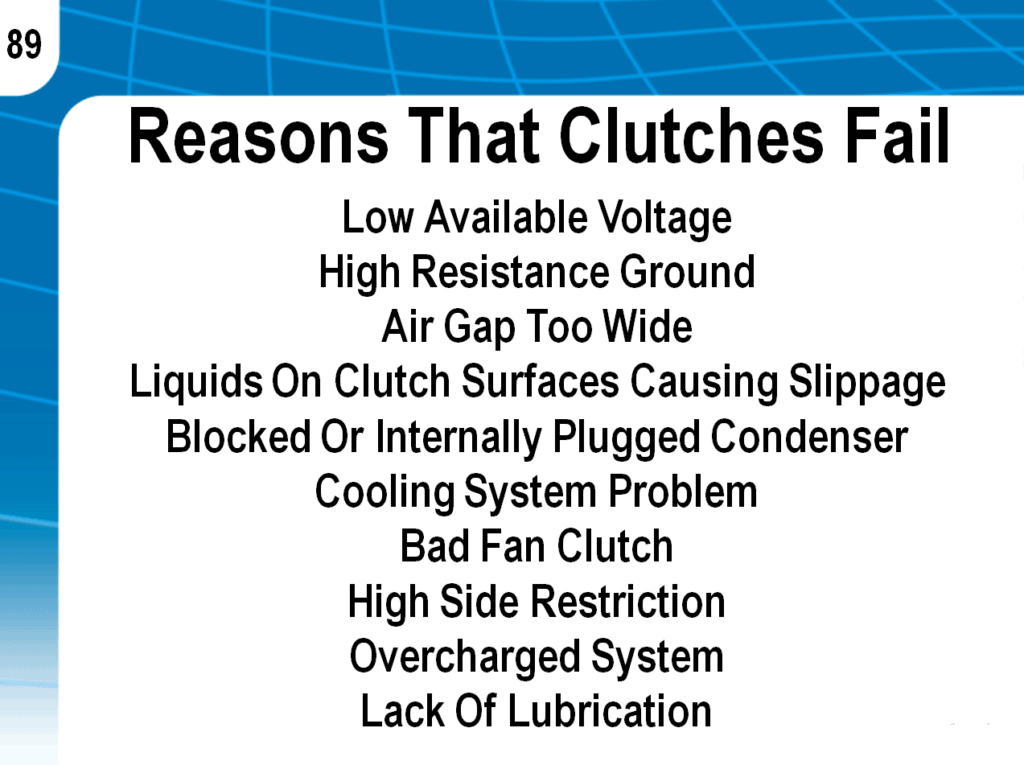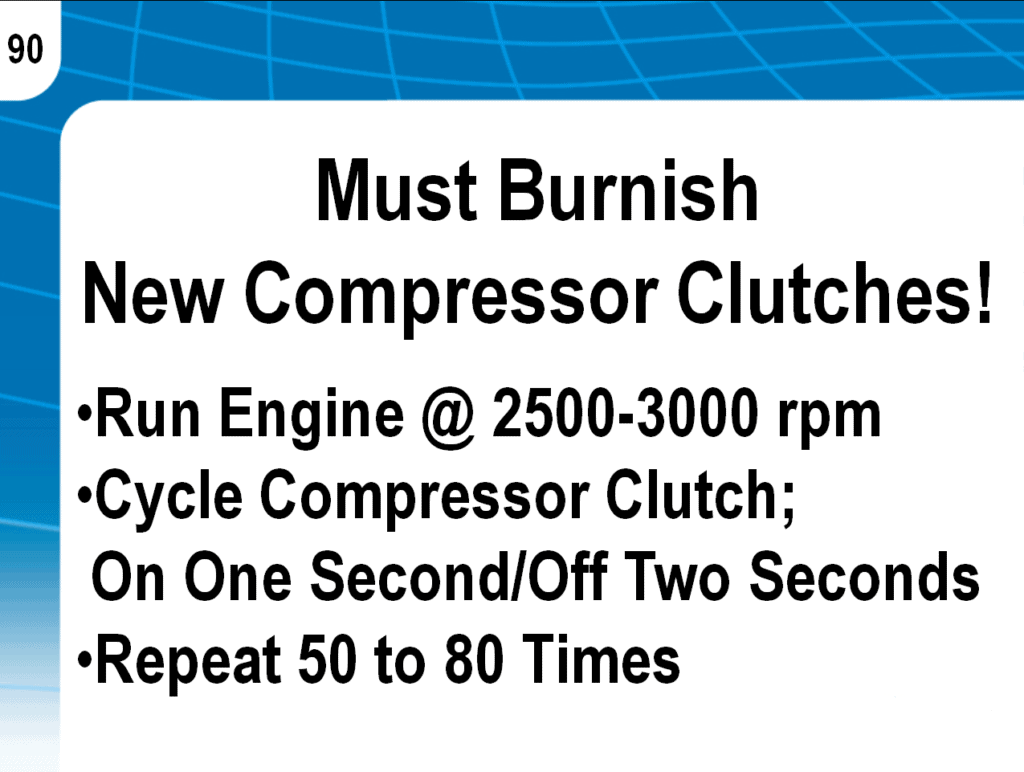A burned clutch is a symptom of another problem
By Richard Hawkins, MACS Contributor
Many years ago, I attended an A/C clinic and a slide in it with the title: A burned clutch Is a symptom of another problem stuck in my memory. When I started answering tech calls it often became a topic of discussion. See picture #1.

Picture #1: A clinic slide like the one I saw years ago.
Not much thought is given to compressor clutches until they fail, but they are extremely durable. I have personally owned three vehicles that had between 200, 000 and 240,000 miles on them. They all still had the original compressors and clutches, and they were still functioning perfectly. Also, over the years numerous conversations have occurred on tech calls where vehicles with similar or higher mileage had the original compressors and clutches functioning perfectly.
Traveling down the road at 55 to 60 MPH, an engine will typically be turning about 1,800 to 2,000 RPM, depending on the vehicle, engine size, gear ratio, etc. When the clutch engages, it accelerates instantly from a dead standstill to the speed the clutch pulley is turning. On a high mileage vehicle with a cycling system, the compressor might have engaged and disengaged more than 100,000 times. Being able to withstand this kind of punishment is nothing short of amazing.
Back in the “good old days”, clutch replacement was a popular occurrence when there was a clutch issue. Nowadays, changing a clutch seems to be a rare occurrence. This is because clutches are not available for a lot of compressors. Also, if they are available, it often costs less for a compressor with a clutch than it does for a clutch by itself and the labor involved to change it out.
On a tech line, burned clutches are a commonly encountered issue. Often a conversation will go something like this:
Technician: I have installed three of your compressors on this truck in the past ten days and the clutches keep burning up. Why are your compressor clutches so “sorry”?
Me: What was the reason the original compressor was replaced when the vehicle came in for service?
Technician: The clutch was burned up on it.
Me: So, you have had four burned clutches on that truck instead of three.
Technician: Well yes. But the original one doesn’t count because the truck has over 100,000 miles on it. The clutch just wore out.
Me: Well maybe, but it is much more likely there is a problem there that caused the clutch on the original compressor to fail. That problem is still present and that is what is causing the clutches on the replacement compressor to burn up. To burn up, those clutches got extremely hot and the reason they got hot was because they were slipping. See picture #2 below.

Picture #2: A slide from a MACS clinic.
Technician: OK, go on.
Me: Did any of the four compressors lock up?
Technician: No.
Me: Did you check the clutch air gaps and the coil resistance on the replacement compressors?
Technician: No, the gap is supposed to be set at the factory and the coil is supposed to have the right amount of resistance.
Me: Yes, the air gap is supposed to be set correctly at the factory and the coil is supposed to have the correct amount of resistance. However, sometimes a clutch ends up with an incorrect air gap and/or a coil with too much resistance. As a result, the clutch air gap and coil resistance should be checked prior to compressor installation. These conditions can cause clutch slippage, but it is extremely unlikely that you received three compressors with these issues. That points back to a problem that is causing the clutches to burn up. See picture #3 below.

Picture #3: A clutch with bearing damage due to excessive heat.
Technician: OK, so what do you think the problem is?
Me: There are several reasons compressor clutches fail. They include, low available voltage, high resistance ground, liquids on clutch surfaces, air gap too wide, blocked or internally plugged condenser, cooling system problem, bad fan clutch, high side restriction, overcharged system and lack of lubrication.
Based on the information you’ve supplied, high side pressure being too high, and voltage and ground issues would be the most likely culprits. See picture #4 below.

Picture #4: Another slide from a MACS clinic.
Technician: The pressures were OK when the system was functioning, so it sounds like I need to focus on the voltage and ground areas.
Me: That would be a good place to start, but don’t totally rule out the other things. Also, heat brings out the worst in electrical systems. Do your electrical testing right after start-up when everything is cool and record the results. Then get everything up to operating temperature and put the A/C system in a high heat load condition and do the tests again and compare the results. Then is when you are most likely to find something.
Whenever a compressor or compressor clutch fails, it is necessary to determine the cause and correct it or another failure is likely. This is called “Root Cause Analysis“. Just replacing the compressor without determining the root cause of the failure is just treating the symptom.
Technician: OK, I’m going to replace the compressor again and check those things out.
Me: Be sure to do a proper oil balance, check the clutch air gap and coil resistance and burnish the clutch. Burnishing the clutch will almost immediately increase the torque capability of the clutch by about 20%.
Technician: What do you mean “burnish the clutch”?
Me: It is sort of like breaking in a new set of disc brake pads.
I proceeded to explain the process. See picture #5 for information.

Picture #5: Clutch burnishing explained in a slide from a MACS clinic.
Editor’s Note:
Richard Hawkins will be presenting the class Behavioral Characteristics of Various Compressor Types at MACS 2021 Training Event and Trade Show. Don’t miss the valuable knowledge Richard has to share. You could save your self hours of diagnostic time. Register here to attend MACS 2021 Training Event and Trade Show, Sept 30-Oct 2 at the Rosen Centre Hotel in Orlando, FL.

The sealed bearing on the a/c clutch going bad is very common. The seal goes bad and the lubricant leaks out and causes bearing failure. Thus the brownish coloring on front of the clutch.